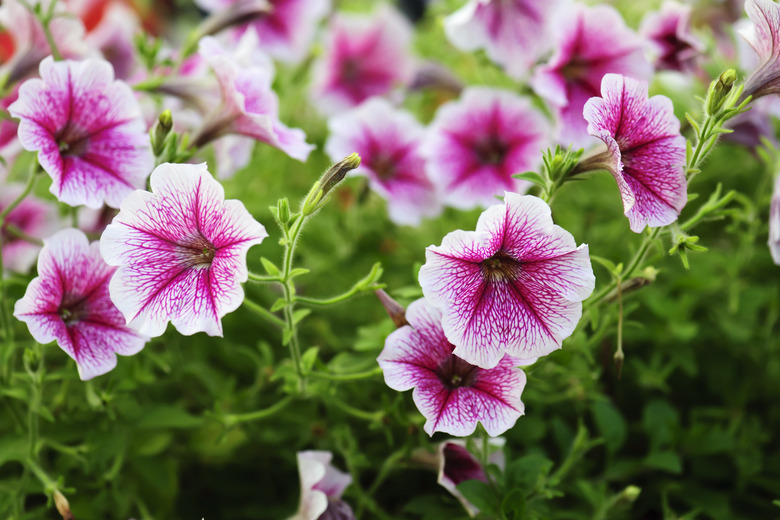Why Are My Petunias Turning Yellow?
We may receive a commission on purchases made from links.
If you're only inviting one plant into your flower garden beds this spring, it's likely to be a petunia. Petunias (Petunia spp.) are easy-care flowering beauties, but they can sometimes harbor problems, such as yellowing foliage. While these flowers are usually grown as annuals and discarded at the end of the season, you still want them to look beautiful and grow vigorously. Many are, in fact, herbaceous perennials in U.S. Department of Agriculture plant hardiness zones 9 through 11.
Petunia foliage turning yellow is never a good sign. It usually indicates a problem with the way you are caring for the plants, from nutrient deficiencies to too little sun. You plant petunias to brighten up your garden with their deep-purple or pink showy blossoms and brilliant green leaves. Whether you are growing grandiflora or multiflora varieties, you will not be happy to see your flowers' foliage turn yellow.
Tip
Petunias often turn yellow due to planting problems, not enough sun, poorly drained soil or lack of fertilizer. Tobacco mosaic virus can also cause yellowing on the foliage.
Good Cultural Care Is Essential
Good Cultural Care Is Essential
The best way to avoid petunias turning yellow is to start with excellent cultural practices. Given that most petunias are grown for one season only, some diseases don't have time to develop. Any yellowing of the foliage is usually due to the way the gardener is caring for the petunias. For example, all of the following can cause petunia leaves to turn yellow: planting too deeply, planting in shade, planting in poorly draining soil and failing to provide fertilizer.
Caring for Petunias
Caring for Petunias
Petunias don't ask for much in exchange for making your garden lovely. They require full, direct sun, at least six hours a day, and light, well-draining soil. If you get significant wind in your area, pick a planting site with some shelter. Transplant the petunias at the same depth they were growing in their nursery pots because deep planting can yellow the foliage.
Be sure to check the roots before you plant because tightly wrapped petunia roots won't get sufficient nutrients. Gently untwist the roots before planting and prune them if necessary. If you do, wipe your garden pruner with alcohol to sterilize the tool.
Petunias need regular irrigation, so give them enough water to keep the soil moist but not wet at all times. It's best to water them with a soaker hose before the sun rises in the morning so the water doesn't get on their leaves, which can cause fungal infections. They also need fertilizer. Apply a water-soluble general fertilizer according to all label recommendations.
Petunias and Tobacco
Petunias and Tobacco
Smoking or using tobacco produces can be bad for you; this is no surprise. But did you know they can also be bad for petunias?
If someone using tobacco products touches your petunia plants, it can potentially spread tobacco mosaic virus to them. This virus turns the foliage a mottled yellow and deforms the leaves as well as the blossoms. Protect petunias and keep all tobacco products out of the garden. If you use any kind of tobacco, scrub your hands before working in the garden.
